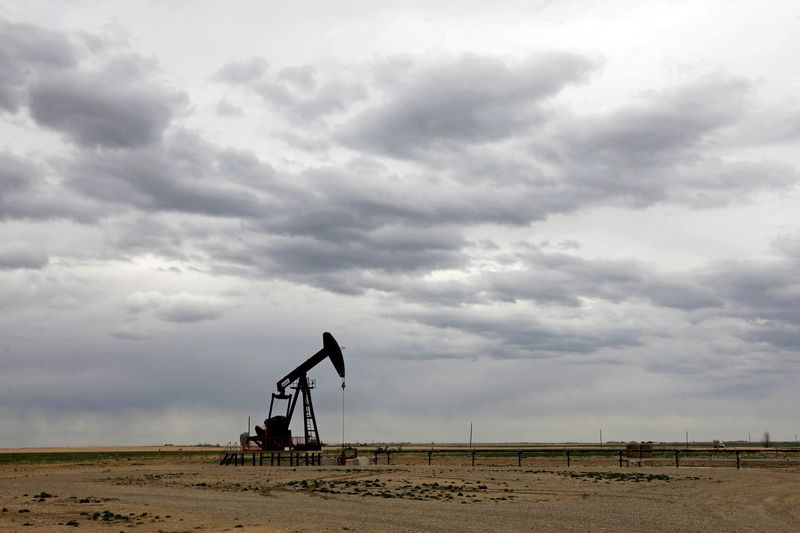By Scott DiSavino
NEW YORK (Reuters) - Oil prices fell about 4% on Monday, with Brent crude tumbling below $100 a barrel on worries that the COVID-19 pandemic will cut demand in China and as International Energy Agency (IEA) countries plan to release record volumes of oil from strategic stocks.
U.S. West Texas Intermediate (WTI) closed at its lowest since Feb. 25, the day after Russian forces invaded Ukraine, an action Moscow calls a "special military operation."
Brent futures fell $4.30, or 4.2%, to settle at $98.48 a barrel, while WTI crude fell $3.97, or 4.0%, to settle at $94.29. It was the lowest close for Brent since March 16.
Fuel consumption in China, the world's biggest oil importer, has stalled with COVID-19 lockdowns in Shanghai, analysts at the Eurasia Group consultancy said. Shanghai, China's financial center, started easing lockdowns in some areas on Monday despite reporting a record of more than 25,000 new COVID-19 infections.
"Even when the restrictions in Shanghai are lifted, China's zero-Covid policies will likely remain a drag on demand," Eurasia Group said, noting Shanghai lockdowns likely reduced China's overall oil consumption by up to 1.3 million barrels per day (bpd).
To help offset a shortfall in Russian crude after Moscow was hit with sanctions, IEA member nations, including the United States, will release 240 million barrels of oil over the next six months.
The release of Strategic Petroleum Reserve (SPR) volumes equals 1.3 million bpd over the next six months, enough to offset a shortfall of 1 million bpd of Russian oil supply, analysts at JP Morgan said.
"The (SPR) release will be the largest of all time, and has already broken the back of the WTI price curve," said Robert Yawger, executive director of energy futures at Mizuho, noting the spreads were sliding toward contango.
Contango signals an oversupplied market. It is when prices for later-dated months are higher than the front-month.
In contrast, when concerns about supply shortages were high in early March, the WTI curve was in what Yawger called "super-backwardation" with each month at least $1 a barrel below the prior month through November 2023.
Adding pressure to crude prices, the U.S. dollar was on track to strengthen for an eighth straight day against a basket of other currencies. A stronger dollar makes oil more expensive for holders of other currencies.
In a move that could tighten global oil supplies, the European Union's (EU) executive is drafting proposals for an embargo of Russian oil, although there was still no agreement to ban Russian crude.
The Organization of the Petroleum Exporting Countries (OPEC) told the EU that sanctions on Russia could create one of the worst-ever oil supply shocks and it would be impossible to replace those volumes. OPEC signaled it would not pump more oil.
U.S. President Joe Biden and Indian Prime Minister Narendra Modi held talks on Monday as Washington pushed its Asian ally to support its response to Russia's invasion.

India, the world's third-biggest oil importer, has increased purchases of Russian crude in recent months because Moscow has been forced to sell its oil at a steep discount since invading Ukraine.
Fuel demand in India rose to a three-year high in March, with petrol sales hitting an all-time peak.